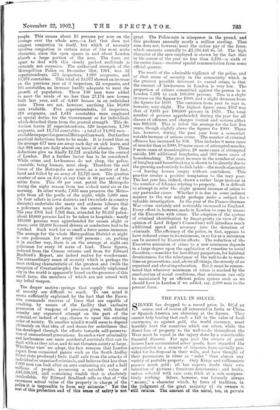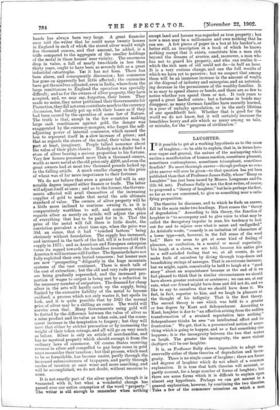THE FALL IN SILVER.
SILVER has dropped to a record price, Is. 101d. an ounce, and of course all interested in India or China or Spanish America are shivering at the figures. They cannot help fearing that such a fall in the value of local currencies, as against gold, the world currency, must horribly hurt the countries which use silver, while the direct loss of property to the well-to-do throughout the West must be equal to the injury done by a considerable financial disaster. For ages past the owners of good houses have accumulated silver goods, have regarded the accumulation as a reserve of treasure, have specially pro- vided for its disposal in their wills, and have thought of their possessions in silver as " safer " than almost any variety of portable property. Only Kings and millionaires possess much gold ; all but experts doubt their own valuation of pictures ; furniture deteriorates ; and books, unless selected with rare care, fetch at a sale compara- tively nothing. Silver, however, was formerly always " money," a character which, by force of tradition, in the judgment of the great majority of its owners it still retains. The amount of the metal, too, in private hands has always been very large. A great financier once told the writer that he could name twenty houses in England in each of which the stored silver would weigh five thousand ounces, and that amount, he added, is a trifle compared to the aggregate of the smaller holdings of the metal in those houses' near vicinity. The enormous drop in value, a fall of nearly two-thirds in less than thirty years, ought to have been as severely felt as a great industrial catastrophe. Yet it has not been. There has been alarm, and consequently discussion ; but commerce has gone on apparently but little affected; the currencies have got themselves adjusted, even in India, where from the large remittances to England the operation was specially difficult; and as for the owners of silver property, they have accepted, and, we may say, forgotten, their losses. They made no noise, they never petitioned their Governments for Protection, they did not even contribute much to the currency discussion, but silently put up with their losses as if they had been caused by the operation of some law of Nature. The truth is that, except in the few countries making large cash remittances against gold, the danger was exaggerated by the currency-mongers, who forgot the self- adjusting power of internal commerce, which caused the loss to represent itself in a slow increase of prices ; and that as regards the stores of the metal, their value was, in part at least, imaginary. People talked nonsense about the value of their plate closets. Nobody not a dealer had a store of silver bearing a serious proportion to his fortune. Very few houses possessed more than a thousand ounces, worth as mere metal at the old price only £200, and even the great owners had at most two thousand pounds locked up in the falling article. A much smaller change in the price of wheat was of far more importance to their fortunes.
We do not believe that even a greater fall will in any notable degree imperil either finance or trade. The latter will adjust itself at once ; and as to the former, the Govern- ments affected will avail themselves of the increasing - supplies of gold to make that metal the sole ultimate standard of value. The owners of silver property will be a little more inclined to continue owning it, as it is comparatively worthless to sell, and commerce, which regards silver as merely an article, will adjust the price of everything that has to be paid for in it. That the price of the metal will fall there is little doubt, the conviction prevalent a short time ago, when the price was 30d. an ounce, that it had " touched bottom " being obviously without foundation. The supply has increased, and increased in the teeth of the fall, till it is fourfold the supply in 1875 ; and as American and European enterprise turns its regard towards the boundless resources of South America it will increase still further. The Spaniards have not fully exploited their own buried treasures ; but keener men are now "prospecting " diligently in the huge mountain systems of the vast continent. There is much talk of the cost of extraction ; but the old and very rude processes are being gradually superseded, and the increased pro- portion of wages to output is being met by a reduction in the necessary number of outputters. The demand for cheap silver in the arts will hardly catch up the supply, being limited by the excessive liability of the metal to become oxidised, a process which not only wastes it, but spoils its look, and it is quite possible that by 1925 the normal price of silver may be a shilling an ounce. The world will survive even that. Many Governments using gold will be fretted by the difference between the value of silver as a mine product and its value as token coin, and the conse- quent increase in the temptation to forgery; but they will meet that either by stricter precaution or by increasing the weight of their token coinage, and all will go on very much as before. Silver is only an article of merchandise, and has no mystical property which should exempt it from the ordinary laws of commerce. Of course States receiving revenue in silver and compelled to pay large sums in gold must reconsider their taxation ; but that process, which used to be so formidable, has become easier, partly through the increased submissiveness of taxpayers, and partly through modes of taxation at once wiser and more searching, and wilt be accomplished, we do not doubt, without recourse to arms.
It is not exactly part of the silver question, though it is Connected with it, but what a wonderful change has passed over our entire conception of the word "property." The writer is old enough to remember when nothing except land and houses was regarded as true property; but now a man may be a millionaire and own nothing that he can see. A few pieces of paper in a box at his banker's, or better still, an inscription in a book of which he knows nothing except that it exists, constitute him a man rich beyond the dreams of avarice, and, moreover, a man who has not to guard his property, and who can realise it— which the rich men of old could not do—in half an hour.
It is a very curious change, and one the full results of which we have yet to perceive ; but we suspect that among them will be an immense increase in the amount of wealth at the disposal of industry and enterprise, and an astonish- ing decrease in the permanence of the wealthy families. It is so easy to spend shares or bonds, and there are so few to notice whether you spend them or not. It took years to spend a great landed estate ; but a fortune in bonds may disappear, as many German families have recently learned, in a year of unlucky speculation, or in the early lifetime of one spendthrift heir. Whether that is good for the world we do not know, but it will certainly increase the breathless hurry and stir which so many among us take, or mistake, for the " progress of civilisation."











































 Previous page
Previous page